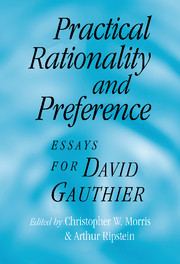Book contents
- Frontmatter
- Contents
- List of Contributors
- Practical Reason and Preference
- What Do Expressions of Preference Express?
- Preference
- Rational Temptation
- Bombs and Coconuts, or Rational Irrationality
- Are Intentions Reasons? And How Should We Cope with Incommensurable Values?
- Two Forms of Practical Generality
- Psychology for Cooperators
- Which Games Should Constrained Maximizers Play?
- The Strategy of Cooperation
- We Were Never in Paradise
Preference
Published online by Cambridge University Press: 11 January 2010
- Frontmatter
- Contents
- List of Contributors
- Practical Reason and Preference
- What Do Expressions of Preference Express?
- Preference
- Rational Temptation
- Bombs and Coconuts, or Rational Irrationality
- Are Intentions Reasons? And How Should We Cope with Incommensurable Values?
- Two Forms of Practical Generality
- Psychology for Cooperators
- Which Games Should Constrained Maximizers Play?
- The Strategy of Cooperation
- We Were Never in Paradise
Summary
The concept of preference plays a central role in much recent moral and political philosophy. Partly because of its pedigree in such widely admired disciplines as economics and decision theory, its status seems secure. Preferences are taken by various philosophers to provide everything from a starting point for moral inquiry to the sole factor that elected officials should take into account. My aim in this essay is to call that status into question. I shall argue that the concept of preference cannot bear the theoretical weight in normative inquiry that it has been asked to support. The argument has two parts. The first examines the place of actual or “revealed” preference in moral argument and shows how it fails to meet even minimal standards as an account of practical reason. The second part considers more sophisticated accounts of ideal or considered preferences, arguing that although they have enough structure to function in accounts of practical reason, their employment presupposes independent standards. This needn't be a damning criticism, except for the manner in which advocates of preference-based accounts maintain that those accounts do not incorporate any controversial normative claims. Much of the appeal of preference-based accounts of practical reason stems from their promise of providing a normative account of practical reason using minimal formal constraints of consistency and the prior motivations of the agent in question.
My strategy will be to establish and exploit parallels between the role of preference in contemporary moral philosophy and the role of perception in classical empiricism. Empiricist epistemology and utilitarian and contractarian moral philosophy have a common ancestry.
- Type
- Chapter
- Information
- Practical Rationality and PreferenceEssays for David Gauthier, pp. 37 - 55Publisher: Cambridge University PressPrint publication year: 2001
- 3
- Cited by



